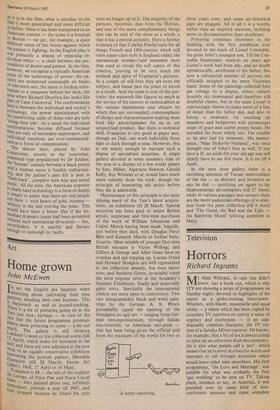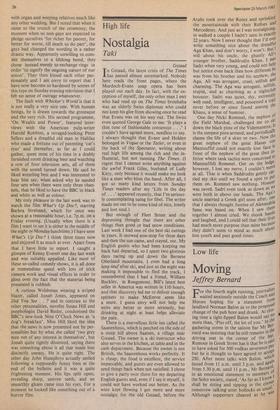Television
Horrors
Richard Ingrams Mr Alan Whicker, in case you didn't know, has a book out, which is why ITV are showing a series of programmes on Sunday nights devoted to highlights of his career as a globe-trotting interviewer. Whicker, with blazer, moustache and nasal whine — a whine which has been copied by countless TV reporters to convey a sense of urgency and excitement — is an una- shamedly common character, the TV ver- sion of a Sunday Mirror reporter. He knows, for example, that a bit of sex is always a help to spice up an otherwise drab documentary. He is also what people call a 'pro', which means that he is never at a loss for words and manages to sail through situations which would leave other men speechless. His first programme, 'On Love and Marriage', was notable for what was probably the first `gay wedding' to be seen on TV. Taking place, needless to say, in America, it was presided over by some kind of non- conformist minister and came complete
with organ and weeping relatives much like any other wedding. But I noted that when it came to the crunch of the ceremony, the moment when us non-gays are expected to pledge ourselves 'for richer for poorer, for better for worse, till death us do part', the gays had changed the wording in a rather drastic way. Apparently unwilling to com- mit themselves to a lifelong bond, they chose instead merely to exchange rings in order `to signify the ongoing nature of our union'. They then kissed each other pas- sionately and I am sorry to report that I have now become so hardened by scenes of this type on Sunday evening television that I felt no sense of outrage whatsoever.
The fault with Whicker's World is that it is not really a very nice one. With human beings, he is drawn towards the grotesque and the very rich. His second programme, 'On Wealth and Power', featured inter- views with the American pulp-writer Harold Robbins, a ravaged-looking Peter Sellers and a dreadful old man in Halifax who made a fortune out of patenting 'cat's eyes' and thereafter, as far as I could gather, spent most of his time in a drably furnished room drinking beer and watching a row of four television sets, all of them with the sound turned down. He said he liked wrestling best and I was interested to hear him say, when asked why he needed four sets when there were only three chan- nels, that he liked to have the BBC in black and white as well as colour.
My only pleasure in the last week was to watch the film What's Up Doc?, starring Barbra Streisand, which for once was shown at a reasonable hour, i.e. 7p.m. on a Friday evening. (Usually when there is a film I want to see it is either in the middle of the night or Monday lunchtime.) I have seen What's Up Doc? I think three times now and enjoyed it as much as ever. Apart from that I have little to report. I caught a glimpse of Kenny Everett one day last week and was suitably appalled. Like most of these so-called comedy shows, it is all done at tremendous speed with lots of trick camera work and visual effects in order to gloss over the fact that the material being presented is rubbish.
A curious Welshman wearing a striped blazer, called Jonah Jones, appeared on Did You See . . ? and in contrast to the other personalities, novelist Susan Hill and psephologist David Butler, condemned the BBC's new-look Nine O'Clock News as 'a dog's breakfast'. Miss Hill liked the idea that the news is now presented not by per- sonalities but by what she called 'two grey men not of any interest in themselves', but Jonah quite rightly dissented, saying there was something about it all that made him distinctly uneasy. He is quite right. The other day John Humphrys actually smiled following a supposedly funny item at the end of the bulletin and it was a quite frightening moment. His lips split open, revealing sharp, uneven teeth, and an unearthly gleam came into his eyes. For a moment he looked like something out of a horror film.



































 Previous page
Previous page